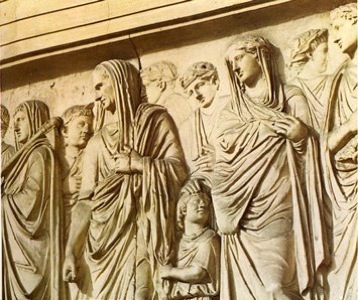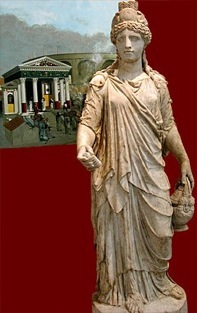



Religion and the Roman Empire



The Roman Empire was a period in which all traditional religions of the earlier ancient world went into decline and were replaced by new religious systems. We must begin today by considering the causes of this decline. Traditional religion declined because it no longer served the purposes for which it had originally been developed. The main purpose of ancient religions was to serve as a focus for political and social loyalties.
Each national group, each city, and sometimes even each family had its own religion. You could tell what a person's background was by observing which gods he worshipped. Greeks worshipped Greek gods, Romans worshipped Roman gods, and others worshipped the gods of their own nationality. Religion was in fact a sign of belonging. An individual accepted their gods because all of his fellow countrymen, friends and relatives also believed in them. This was true, for example, of Judaism, the Hebrew religion, which was a national religion intended only for Hebrews.
With the coming of the Roman Empire, older nationalities and social groupings became less important. National gods were less important because the older political groupings were absorbed into the Roman Imperial state. The establishment of a worldwide peace made it possible for persons to move freely from one place to another, and many people did move to improve their economic condition. An Athenian might end up in Gaul, A Spaniard in the Egypt. When this happened, the individual was separated from his old friends and relatives and from his traditional religion.
One consequence of the up rooting of people was that they no longer had clear-cut rules to live by, no guide for proper behavior. This was not because of the decline of religion. Except for Judaism, no ancient religion provided rules to follow in life. In ancient societies, behavior was controlled by social pressure. You acted a certain way because your friends, relatives, and fellow citizens would reject you if you did not. People who were up-rooted no longer knew how to behave.
At the same time there was a growing feeling that leading an ethical life, behaving in a proper manner, was important. The Greek philosophers argued that a man should be good, and they succeeded in convincing everybody that this was true. But the rules of the philosophers were for well-educated people with logical minds. They did not appeal to the masses.
The Imperial Cult
When the old national religions declined, the Romans tried to create new religion to replace it. This was an imperial religion that would do for the Empire and Rome with the older religions have done for cities and nations.
This imperial religion had two parts. The first part of the religion was the worship of the goddess Roma. Roma was a deity who had been made up to represent the Roman state. The second part of the religion was the worship of the cult of the Emperor himself. It varied in different parts of the Empire. In lands like Egypt, where the rulers had always been considered gods, the emperor was worshipped as a god. Since the Romans did not believe that men could be gods, people in the Roman areas worshipped the genius of the emperor instead. The Romans believed that every man had a genius, the spirit that watched over him and kept him from harm. Since everyone wanted the emperor to be safe, everyone worshipped his genius.

This imperial religion was not really a successful replacement for older religions for several reasons. First, it was purely political. You followed it only to show that you were loyal to the state. It was not a proper religion at all. It did not set forth any ethical rules to live by. Since everybody followed it, it did not give you the feeling of belonging to group.
Mystery Religions
So, the traditional ancient religions declined, and the new imperial religion did not provide an adequate substitute for them. As a result the Roman Empire saw the appearance of many new religions. The most popular of the new religions are called mystery religions. They were not all exactly alike, but they do tend have some things in common. They contrast sharply with older patterns.
First of all, the mysteries were universal religions. They were intended for everyone who wanted to join, not just members of a particular national group. Often the religion might be dedicated to an old national deity, particularly one from the Near East. One popular mystery religion featured Isis, a traditional Egyptian goddess. But the mysteries also included rites, ideas and myths from many other religions. For instance, Isis was equated with many goddess is for many cultures. These were not the ancient cults, but cults rebuilt around earlier Greek mystery religions with ancient non-Greek deities for consumption in hellenistic kingdoms.
Secondly, the mystery religions were personal religions. You joined one as an individual, not as a citizen or as the member for particular family.
Finally, the mystery religions had one other thing; they had mysteries. To ensure that one worshiped as an individual, the worshiper had to go through an initiation ceremony. By performing these ceremonies, you became a member of the religion. These were secret. Only persons who were initiated knew what they were. They were like fraternity initiations. Since they were secret, they were called mysteries.




The mystery religions were popular because they helped to fill the void in men's lives that the conditions of the Empire created. Accepting a mystery religion made you a member of a new group, not a national but a religious group, the congregation. Mystery religions also gave believers rules to live by. Worshippers of Isis sometimes had to shave their heads; and they were supposed to be good people, although this was not worked out in detail. At any rate worshippers in mystery religions gained new customs to follow, and this gave them a sense of belonging. Membership made you feel important. By going through the mysteries, you became associated with the god of the religion. Greeks and Romans needed this feeling of importance because they could no longer be important by involving themselves in politics.

A Roman statue of Isis, probably kept by an Isis Mystery cult worshipper in the early second century, A.D.
Christianity
Of all the new religions that began during the Roman Empire, one is by far the most important. That religion is Christianity, which gradually spread and became established through the Roman world. Now we should consider quite grew as much as it is why it became so popular.
Christianity benefited from some of the same factors that helped the other mystery religions; and in fact, Christianity is a mystery religion. It is a universal religion intended for everybody. It is intended for the individual; it stresses a personal relationship between worshipers and God. In has ceremonies for the worshipers alone-sacraments such as baptism and communion.
Christianity also had some characteristics that made it different from the other mystery religions. These characteristics also made it far more popular. We must therefore consider them.
The central figure of Christianity was Jesus Christ. He was not the traditional god or mythical figure. He was a real person. He was much easier to identify with, particularly for members of the lower classes. He gave the religions historical basis.
Christianity was a monotheistic, exclusive religion. If you became a Christian, you abandoned all other religions. This was not true of other mysteries. You could worship Isis, the Emperor, Rome, and even traditional gods at the same time. This gave Christians a stronger sense of belonging to a definite group or congregation.
Also, because Christianity developed out of Judaism, it had many more ethical rules to follow. Some mysteries, like the religion of Isis, said you should be a good person; but they did not say how you were supposed to do that. Christianity provided a better guide to conduct, one that was as well developed as those of the Greek philosophers. But you did not have to be a philosopher to understand and follow the rules. Christianity had an appeal for both educated and uneducated people alike.
Finally Christianity had extensive scriptures, religious writings that Christians could turn to that would explain their religion and clarify the rules of belief and behavior. It had the Old Testament taken from Judaism. It soon also came to have many Christian writings as well.
Roman Religious Tolerance & the Christians
Contrary to popular belief, the Romans were very tolerant in their actions toward religions other than their own. They recognized all the old traditional national religions, just as they tolerated the traditional laws of their subjects. They did not object to the mystery religions either, as long as they did not interfere with older religions too much.
The only requirement that the government set down was that everyone should accept the Imperial religion, the cult of Roma and Emperor, along with other traditional religious observances. They even made an exception to that rule in the case of the Jews. The Romans realized that the Hebrews could not accept the Imperial religion because their traditional religion was monotheistic. Long before Roman times, the worship of all other religions had been forbidden among Jews. The Hebrews were exempted, therefore, from the Imperial religion as long as they did not seek to convert other people, which they didn't do.
Christianity was a special case, however, and we must look at the Roman policy toward Christianity more closely. Eventually, it became the illegal to be a Christian. Nero persecuted Christians after laying the blame for the Great Fire of Rome. A law was passed against Christians possibly around 75 A.D. The reasons were political. The emperors thought that the Christians were subversive and opposed to the state. Like Judaism Christianity was monotheistic, and Christians did not accept the Imperial religion. Unlike Judaism, however, Christianity was new and evangelical; Christians wanted everybody to become a Christian and to renounce the Imperial religion.
The laws against Christianity did not mean that there was widespread arrest and execution of Christians, at least not immediately. In 112 A.D., the second of the Good Emperors - Trajan (98 -117), wrote a letter to one of the governors in the provinces outlining procedures to be followed in dealing with Christians. He said that anyone accused of being a Christian must worship in the Imperial cult or suffer the penalty of death. But he instructed the governor to ignore the Christians unless some private citizen brought charges. This was the standard procedure. Because of this policy, action was taken against the Christians only on rare occasions.


